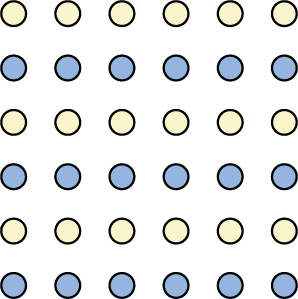| << Chapter < Page | Chapter >> Page > |

Two additional Gestalt principles are the law of continuity (or good continuation ) and closure . The law of continuity suggests that we are more likely to perceive continuous, smooth flowing lines rather than jagged, broken lines ( [link] ). The principle of closure states that we organize our perceptions into complete objects rather than as a series of parts ( [link] ).


According to Gestalt theorists, pattern perception , or our ability to discriminate among different figures and shapes, occurs by following the principles described above. You probably feel fairly certain that your perception accurately matches the real world, but this is not always the case. Our perceptions are based on perceptual hypotheses : educated guesses that we make while interpreting sensory information. These hypotheses are informed by a number of factors, including our personalities, experiences, and expectations. We use these hypotheses to generate our perceptual set. For instance, research has demonstrated that those who are given verbal priming produce a biased interpretation of complex ambiguous figures (Goolkasian&Woodbury, 2010).
In this chapter, you have learned that perception is a complex process. Built from sensations, but influenced by our own experiences, biases, prejudices, and cultures , perceptions can be very different from person to person. Research suggests that implicit racial prejudice and stereotypes affect perception. For instance, several studies have demonstrated that non-Black participants identify weapons faster and are more likely to identify non-weapons as weapons when the image of the weapon is paired with the image of a Black person (Payne, 2001; Payne, Shimizu,&Jacoby, 2005). Furthermore, White individuals’ decisions to shoot an armed target in a video game is made more quickly when the target is Black (Correll, Park, Judd,&Wittenbrink, 2002; Correll, Urland,&Ito, 2006). This research is important, considering the number of very high-profile cases in the last few decades in which young Blacks were killed by people who claimed to believe that the unarmed individuals were armed and/or represented some threat to their personal safety.
Gestalt theorists have been incredibly influential in the areas of sensation and perception. Gestalt principles such as figure-ground relationship, grouping by proximity or similarity, the law of good continuation, and closure are all used to help explain how we organize sensory information. Our perceptions are not infallible, and they can be influenced by bias, prejudice, and other factors.
Have you ever listened to a song on the radio and sung along only to find out later that you have been singing the wrong lyrics? Once you found the correct lyrics, did your perception of the song change?

Notification Switch
Would you like to follow the 'Chapter 5: sensation and perception sw' conversation and receive update notifications?